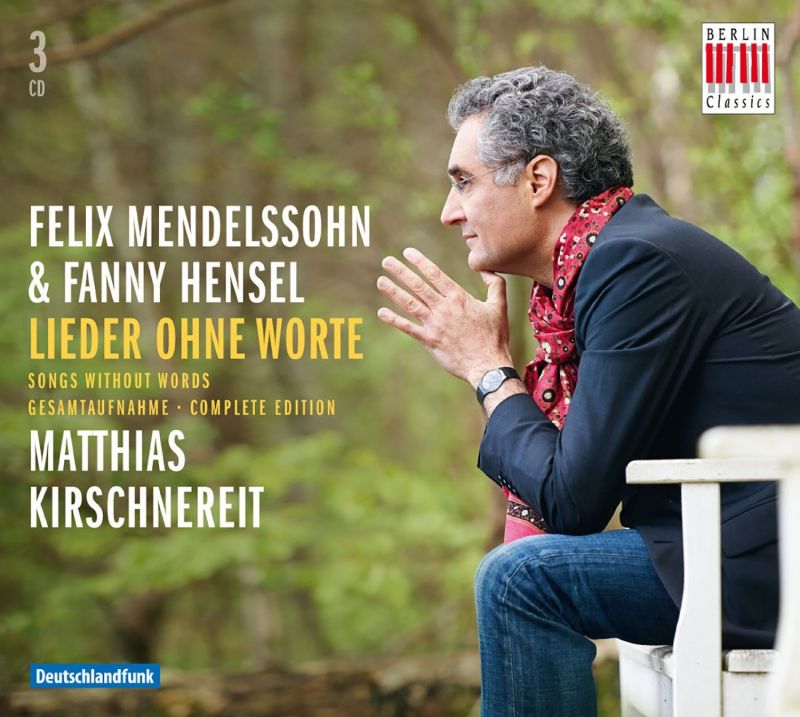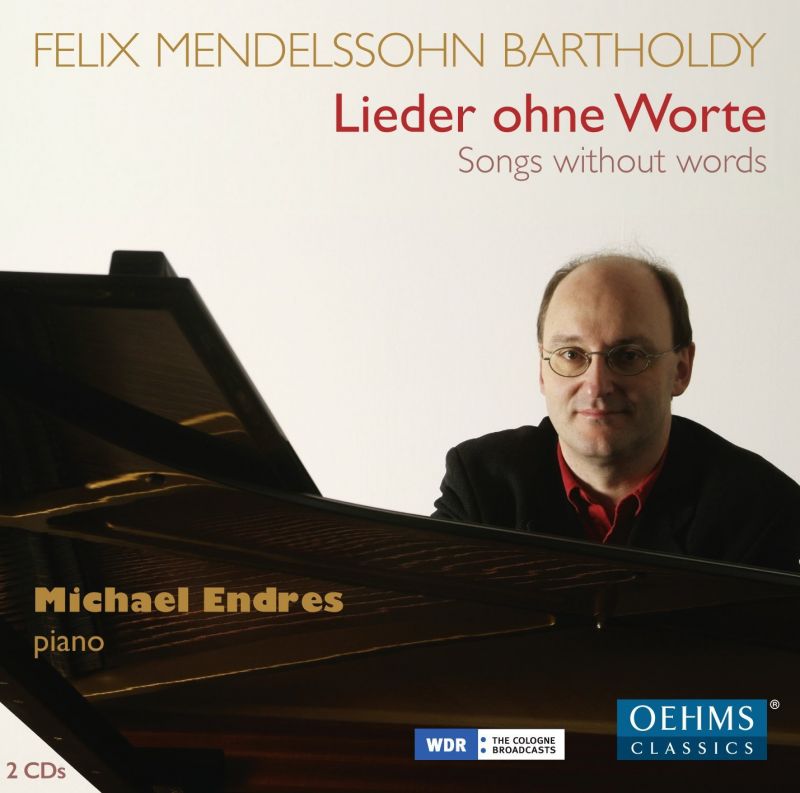MENDELSSOHN; F HENSEL Songs Without Words
View record and artist detailsRecord and Artist Details
Composer or Director: Fanny Mendelssohn-Hensel, Felix Mendelssohn
Genre:
Instrumental
Label: Berlin Classics
Magazine Review Date: 11/2015
Media Format: CD or Download
Media Runtime: 190
Mastering:
DDD
Catalogue Number: 0300639BC

Tracks:
| Composition | Artist Credit |
|---|---|
| (48) Songs without Words |
Felix Mendelssohn, Composer
Felix Mendelssohn, Composer Matthias Kirschnereit, Piano |
| (4) Lieder ohne Worte |
Fanny Mendelssohn-Hensel, Composer
Fanny Mendelssohn-Hensel, Composer Matthias Kirschnereit, Piano |
| Pastorella |
Fanny Mendelssohn-Hensel, Composer
Fanny Mendelssohn-Hensel, Composer Matthias Kirschnereit, Piano |
Composer or Director: Felix Mendelssohn
Genre:
Instrumental
Label: Oehms
Magazine Review Date: 11/2015
Media Format: CD or Download
Media Runtime: 118
Mastering:
DDD
Catalogue Number: OC452

Tracks:
| Composition | Artist Credit |
|---|---|
| (48) Songs without Words |
Felix Mendelssohn, Composer
Felix Mendelssohn, Composer Michael Endres, Piano |
Author: Harriet Smith
As countless pianists down the ages have proved, the Songs Without Words respond best to a non-sentimental approach, as witness artists as different temperamentally as Barenboim, Perahia and Perianes. If one were to generalise, Michael Endres is the more outgoing of the two, Kirschnereit more eager to internalise. Yet the latter is more of a colourist than Endres: in the third of Op 19, for example, with its hunting-horn calls and bounding energy, Endres sounds relatively monotone. But neither fully captures the half-lights of the mournful Op 19 No 6, so achingly conveyed by Perianes.
In the opening number (marked Andante espressivo) of the second book, Op 30, both new versions are faster than the soulfully slow Barenboim. Yet what’s striking is that the Argentinian never sounds too slow, thanks to his finely tuned voicings, alongside which the desynchronised Kirschnereit seems somewhat gauche. In the elfin Op 30 No 2, again it is Barenboim who bewitches. On the other hand, it is Perianes who seduces in the F sharp minor ‘Gondolier Song’ that closes the set, Endres sounding deliberate by comparison. However, there are times when Perianes can sound a touch fey – in the ‘Gondolier Song’, Op 62 No 5, for instance, where both Endres and Kirschnereit find a great directness of utterance.
The fourth book, Op 53, is particularly delectable and Kirschnereit responds eagerly to the Presto agitato marking of the third number; Endres, while full of energy, is a little coarser in execution. And in the penultimate number of the set, Barenboim catches well its agitation, alongside which Endres seems a tad portentous. In the famous ‘Spinnerlied’ of Op 67, always a good testing ground, Endres comes across as a touch hard-edged in his left hand, but then Kirschnereit simply sounds too careful. Put on Rachmaninov, though, and all bets are off (I marginally prefer the clarity of the 1920 version over that of 1928, both available in his box of complete recordings – RCA).
Though it will be clear that I have reservations about both sets, Kirschnereit’s addition of a disc of Fanny Mendelssohn is an enticing prospect. As the 19th-century critic Henry F Chorley pointed out, had she been ‘a poor man’s daughter, she would have been known throughout the world, alongside Frau Schumann and Madame Pleyel, as a female pianist of the highest order’. And highly regarded as a composer too. But Kirschnereit tends to underplay their drama (in the churning second number of Op 2, for instance), and the effect overall is emotionally tepid. While he’s elegant in the first of Op 6, the climax of the second piece could have had more impact, while Op 8 No 2’s adventurous harmonic language passes for relatively little. The field is still wide open for a really first-rate recording of these piano pieces.
Discover the world's largest classical music catalogue with Presto Music.

Gramophone Digital Club
- Digital Edition
- Digital Archive
- Reviews Database
- Full website access
From £8.75 / month
Subscribe
Gramophone Full Club
- Print Edition
- Digital Edition
- Digital Archive
- Reviews Database
- Full website access
From £11.00 / month
Subscribe
If you are a library, university or other organisation that would be interested in an institutional subscription to Gramophone please click here for further information.




